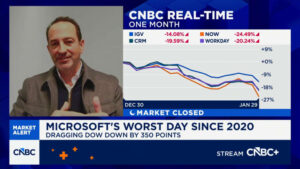At the beginning of Donald Trump’s presidential campaign, National Enquirer publisher David Pecker vowed to be his “eyes and ears,” looking out for any stories that could cause him damage.
Pecker instructed his trusted henchman, the Enqurer’s top editor, Dylan Howard, to treat Trump as a “friend of Pecker,” people familiar with the matter have said, and that any negative news about Trump needed to go away, no matter the cost.
Now, Pecker may become Trump’s worst nightmare.
The former CEO of American Media Inc., then the parent company of the Enquirer and other supermarket tabloids, Pecker is now set to be a star witness for Manhattan District Attorney Alvin Bragg in the criminal case unsealed against Trump Tuesday for falsifying business records.
At the heart of the indictment is the “catch-and-kill” scheme to buy damaging stories and bury them, which prosecutors say Trump, Pecker and Trump’s then-personal lawyer, Michael Cohen, hatched at an August 2015 meeting at Trump Tower, just two months after Trump declared his candidacy.
In 2018, Cohen, who once said he would “take a bullet” for Trump, pleaded guilty to federal campaign finance and tax evasion charges for his role in the arrangement. Trump wasn’t charged in that case but named as an unindicted “co-conspirator No. 1” in court documents.
While Cohen testified before the grand jury in the New York State case and will surely provide testimony at trial, legal experts have questioned the extent of his value as a witness given his prior guilty plea and that he has since publicly expressed that he views it as his job to take Trump down.
That might make Pecker’s testimony even more valuable. He was brought before the grand jury twice and is expected to make a splash on the stand at trial.
In the years between the Trump Tower meeting and the election, the Enquirer would identify three stories that could hurt Trump, buying two of them themselves and steering the third to Cohen, who paid $130,000 out of his own pocket to hush them up.
The first involved a story from a doorman at one of Trump’s buildings, Dino Sajudin, who claimed to know that Trump had an out-of-wedlock child with an employee. Even though the Enquirer quickly determined that Sajudin’s story was likely not true, it agreed to pay him $30,000 to make sure he did continue to spread the rumor.
The next involved former Playboy bunny Karen McDougal, who approached the Enquirer with a story that she had briefly been Trump’s mistress in 2005. The Enquirer paid her $150,000 for her story but never ran it.
And lastly, there was Stormy Daniels, a porn star who claimed to have had an affair with Trump shortly after his wife, Melania, had given birth to their son. In that case, the Enquirer connected her to Cohen, who paid her $130,000 for the story out of his own pocket. He was later reimbursed by the Trump Organization, purportedly for legal services – a payment that the DA argues violated New York State tax and campaign finance laws and elevated the entire case to a felony.
For Trump, the benefits of the deal were obvious, but for Pecker it was never quite so direct. He had long counted Trump as a personal friend. But people close to him have long said that he believed that if he had an ally in the White House, it would make it easier for him to find new backers for his struggling publishing company.
In 2014, American Media nearly collapsed under a crushing debt load of close to $1 billion, and the company’s chief lender, hedge fund Chatham Asset Management, had taken over. The firm now held around 80% of AMI’s equity and over 80% of its debt.
Over the next few years, Pecker sought to hold back the flood through acquisitions, turning to Chatham to finance the $100 million purchase of US Magazine and several other smaller celebrity tabloids. In 2018, Pecker attempted to buy TIME magazine, Sports Illustrated, Fortune and Money from Meredith Corp. for $325 million, but the offer was rejected.
Nevertheless, Pecker had always been on the lookout for other backers, and around that time, engaged in on-again, off-again talks with financiers in Saudi Arabia, even bringing an agent for one to a meeting with Trump at the White House. No deal was ever reached.
Chatham has long denied having any knowledge of the catch-and-kill arrangement and that all editorial decisions at the Enquirer were handled by Pecker and Howard.
But new details of how Chatham benefited from its ownership of AMI were revealed earlier this week when the Securities and Exchange Commission announced a $19.3 million settlement with the hedge fund over its manipulation of AMI’s bond pricing.
According to the SEC, between 2016 and 2018, Chatham had parked about 11% of its $8 billion in assets under management into AMI high-yield bonds.
Every so often, Chatham would need to sell some of those bonds, either because a client wanted to redeem some money or the hedge fund’s portfolio structure needed to be rebalanced. It was also around that time that news of the catch-and-kill deals came to light, and Chatham came under pressure from some clients to distance their investments from the magazine company.
But the bonds were highly illiquid and there was no market for them, so Chatham simply sold them from one client to another, the SEC said. The problem came with the pricing of the bonds. The SEC said that since there was no open market for them Chatham simply made the prices up. The figures it came up with were significantly higher than what similar types of bonds were commanding at the time, according to court filings.
With every transaction, Chatham collected a fee, and over the course of those three years, Chatham pocketed $11 million, the SEC said.
In a statement, Chatham said it had relied upon the advice of an independent compliance consultant when it made the sales and believed it had acted in accordance with the law. While the firm agreed to pay the penalty, it admitted no wrongdoing.
This post was originally published on Market Watch






